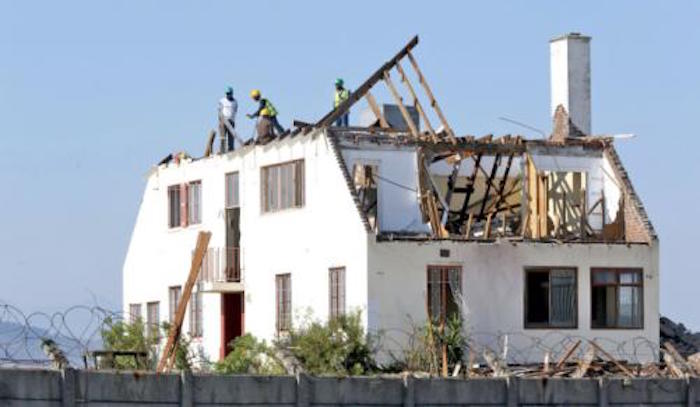A bitter row is raging between local residents and the Athlone School for the Blind over the demolition of a 60-year-old manor house to make way for a social housing development.
Residents are concerned about the impact on pupils of the development which will see over 900 flats being built 15m to 20m from the school’s hostel in Bellville South.
The Manor House in Glenhaven, that is over 60 years old, has been demolished allegedly without proper processes being followed. Picture: Shelley Christians. Credit: Shelley Christians
They are also concerned about the impact of a high density development on infrastructure and traffic in the area.
“We have been labelled anti-poor but that is far from the truth,” said Ricardo Persens, chairman of the Glenroma Forum, which represents residents.
“We are concerned about the impact of a development we don’t believe was well thought out and which just seems to have been bulldozed through.”
The Athlone School for the Blind Association reportedly sold the manor house, which is on just over 7ha for financial reasons, but the communities of Glenhaven and Beroma in Bellville South are fighting the proposed development and are raising funds for legal action.
They have also laid a criminal complaint, saying the historic home had been misrepresented in the environmental impact assessment by not being identified as having heritage value.
The home was demolished earlier this month.
Persens said they had brought the misrepresentation to the attention of Heritage Western Cape, but were told there was nothing that could be done as the decision was made in 2010/ 2011.
Persens outlined some of their concerns in a letter to mayor Patricia de Lille earlier this year, which highlighted inadequate public participation in the rezoning process.
“The community became aware that a historic manor house on the property was never mentioned in the environmental impact assessment.
“After becoming aware that the developer and the site owner had been demolishing the structure, we alerted Heritage Western Cape, the Department of Environmental Affairs and the city.”
He said despite two cease work orders being issued, the contractor had continued.
Persens said in his letter he believed the process was fundamentally flawed and asked the council to enforce a stoppage of all work currently taking place on site.
The Glenroma Forum also said the council had ignored the fact that the association of the Athlone School for the Blind, which was started by the Anglican Church in 1927, did not have the authority to sell the property without Archbishop Thabo Makgoba’s signature.
Shelley Christians, who has been assisting the forum, said Makgoba was a trustee and, according to the title deed, the Archbishop had to jointly sign if the land was sold.
Currently the only signature was from the school association chairman Brian Beck, which meant the sale was not legitimate, they believed.
She said they wrote to Makgoba, who in turn asked Bishop Raphael Hess to look into the matter.
On June 1, Hess sent a letter to De Lille requesting a halt to any demolition or “any other construction work on the premises”.
He wrote: “We believe that the Anglican Church is a trustee and therefore needs to be consulted regarding the sale and demolition of property on the premises of the Athlone School for the Blind.”
But this too received no response, Christians said.
The Cape Argus tried to reach Beck on Monday, but was referred to the association’s legal adviser Lloyd Fortuin, who said he was not in a position to issue a statement on their behalf.
Johan van der Merwe, mayoral committee member for energy, environmental and spatial planning said an application for rezoning was approved by the council in 2014 for a general residential development of 944 residential flat units.
He said the application submitted and processed by the city council followed the correct public participation processes as required in terms of the council’s notification policy and the Land Use Planning Ordinance 15 of 1985, which was applicable at the time.
Van der Merwe said the environmental and heritage authorisations made reference to the subject properties on which the development was proposed and the decisions in this regard would include all structures on the property.
“The authorisations were granted by the Department of Environmental Affairs and Development Planning: Western Cape Government.”
[Source: Cape Argus]





 WhatsApp us
WhatsApp us 

